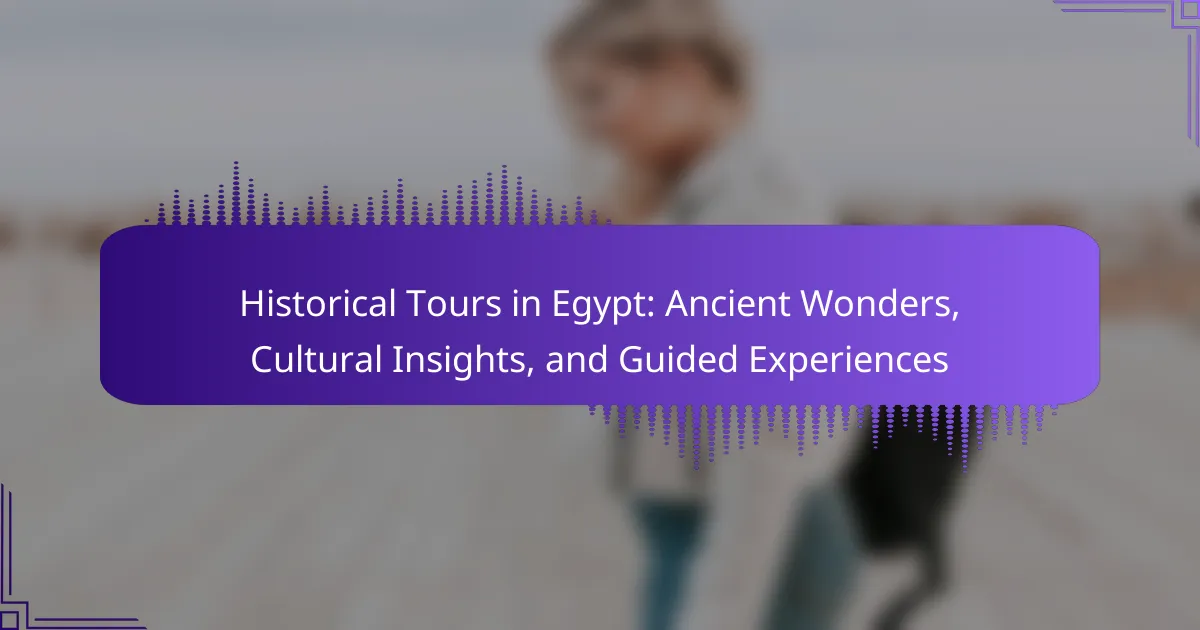Exploring Egypt through historical tours offers a unique opportunity to connect with ancient wonders and cultural insights. Key sites include the Pyramids of Giza, Luxor Temple, and the Valley of the Kings. Guided experiences highlight both famous landmarks and lesser-known treasures, enriching visitors’ understanding of Egypt’s rich heritage. Engaging with local traditions enhances the overall experience, making each tour memorable and impactful.
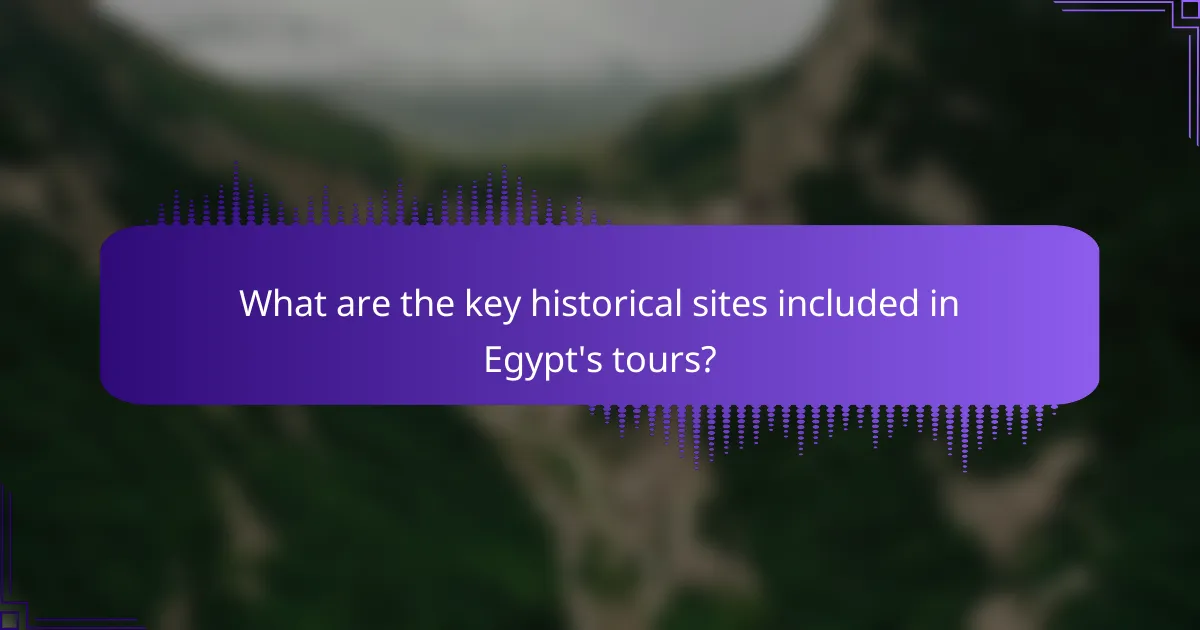
What are the key historical sites included in Egypt’s tours?
Egypt’s tours feature key historical sites such as the Pyramids of Giza, Luxor Temple, Karnak Temple, the Valley of the Kings, Abu Simbel, and the Egyptian Museum. These locations showcase ancient architecture, significant artifacts, and rich cultural heritage.
The Pyramids of Giza, including the Great Pyramid, are iconic symbols of ancient engineering. Luxor Temple and Karnak Temple serve as monumental sites reflecting the grandeur of the New Kingdom. The Valley of the Kings houses royal tombs, emphasizing ancient burial practices. Abu Simbel features colossal statues of Ramses II, demonstrating artistry and religious significance. The Egyptian Museum contains a vast collection of antiquities, providing insights into ancient Egyptian civilization.
These sites collectively offer a profound understanding of Egypt’s historical narrative and cultural evolution.
How do the pyramids of Giza enhance the tour experience?
The pyramids of Giza significantly enhance the tour experience by offering a tangible connection to ancient history and culture. Visitors can explore the architectural marvels that showcase the ingenuity of ancient Egyptian civilization. Guided tours provide in-depth insights into the construction techniques and historical significance of each pyramid, enriching the understanding of their purpose as burial sites for pharaohs.
Additionally, the dramatic landscape surrounding the pyramids creates a stunning backdrop for photography and reflection. Engaging with knowledgeable guides allows tourists to ask questions and gain unique perspectives, making the experience memorable. The opportunity to witness one of the Seven Wonders of the Ancient World firsthand adds a rare value to any historical tour in Egypt.
What role does the Valley of the Kings play in historical tours?
The Valley of the Kings is a central feature of historical tours in Egypt, showcasing ancient royal tombs. This site provides insight into the burial practices and beliefs of ancient Egyptians. Visitors explore elaborate tombs, including that of Tutankhamun, which highlight artistry and historical significance. The Valley’s archaeological importance attracts scholars and tourists alike, enriching cultural understanding. Guided tours often include expert commentary, enhancing the experience with historical context and storytelling.
Why is the Temple of Karnak a must-visit for tourists?
The Temple of Karnak is a must-visit for tourists due to its extraordinary historical significance and architectural grandeur. This ancient temple complex, dedicated to the god Amun, spans over 200 acres and showcases stunning hieroglyphics, massive columns, and intricate carvings. Visitors can explore the Great Hypostyle Hall, which features 134 towering columns, each standing 10 meters high, exemplifying ancient Egyptian craftsmanship. The site’s rich history, dating back over 3,000 years, offers deep cultural insights into the religious practices and daily life of ancient Egyptians, making it an essential stop for anyone interested in Egypt’s historical tours.
Which lesser-known sites offer unique insights into ancient Egyptian culture?
Lesser-known sites such as the Temple of Hathor at Dendara and the ancient city of Akhetaten provide unique insights into ancient Egyptian culture. Dendara features intricate carvings and a well-preserved temple dedicated to the goddess Hathor. Akhetaten, once a thriving metropolis, showcases the revolutionary art and religious practices initiated by Pharaoh Akhenaten. Exploring these sites reveals the complexities of ancient Egyptian beliefs and social structures.
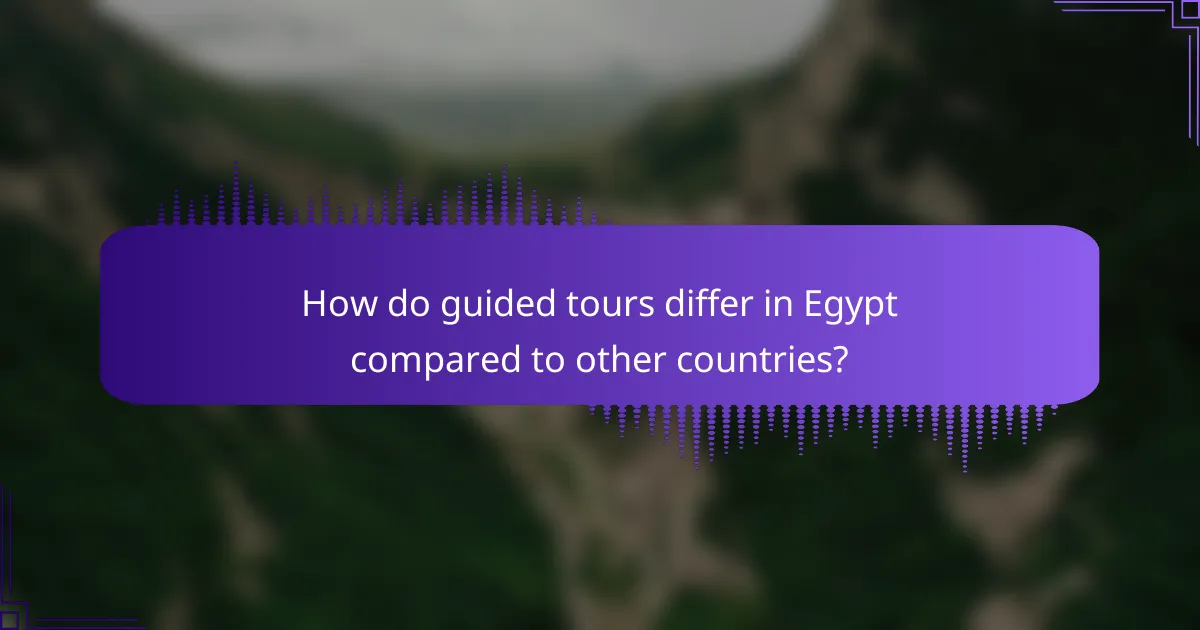
How do guided tours differ in Egypt compared to other countries?
Guided tours in Egypt emphasize ancient history and cultural immersion, setting them apart from those in other countries. Egypt’s tours often include access to iconic sites like the Pyramids of Giza and the Valley of the Kings, with expert guides providing in-depth historical context. In contrast, many other countries may focus on broader themes or contemporary attractions.
Egypt’s unique attribute is its rich tapestry of ancient civilizations, allowing tours to delve into thousands of years of history in a concentrated geographical area. Additionally, the immersive experiences often involve local traditions, such as traditional meals or cultural performances, enhancing the overall experience.
In many countries, guided tours may prioritize convenience and modern comforts, while Egyptian tours frequently blend adventure with education, appealing to history enthusiasts. The duration of tours in Egypt can also be longer, often spanning several days to fully appreciate the vast historical landscape.
Overall, the combination of ancient wonders, cultural insights, and specialized guided experiences makes historical tours in Egypt distinct from those offered elsewhere.
What are the benefits of choosing a local guide for historical tours?
Choosing a local guide for historical tours in Egypt enhances your experience significantly. Local guides provide authentic cultural insights and in-depth knowledge of ancient wonders. They can share unique stories and rare facts that enrich your understanding of the sites. Furthermore, local guides often have personal connections to the history, offering perspectives that general tours cannot provide. This personalized experience can lead to a deeper appreciation of Egypt’s rich heritage.
How does the structure of tours vary between group and private experiences?
Group and private historical tours in Egypt differ significantly in structure. Group tours typically follow a fixed itinerary, accommodating larger numbers of participants, which can enhance social interaction but limit personalized experiences. Private tours offer tailored itineraries, allowing for flexibility in timing and focus, catering to individual interests and preferences. Group tours often include shared transportation and guide services, while private tours provide exclusive access to guides and vehicles, enhancing the overall experience.
What common challenges do travelers face when booking tours in Egypt?
Travelers often face challenges such as language barriers, varying tour quality, and unclear pricing when booking historical tours in Egypt. These issues can lead to misunderstandings and dissatisfaction. Additionally, limited availability of tours during peak seasons can complicate planning. Travelers may also struggle with navigating local customs and ensuring safety while exploring ancient sites.
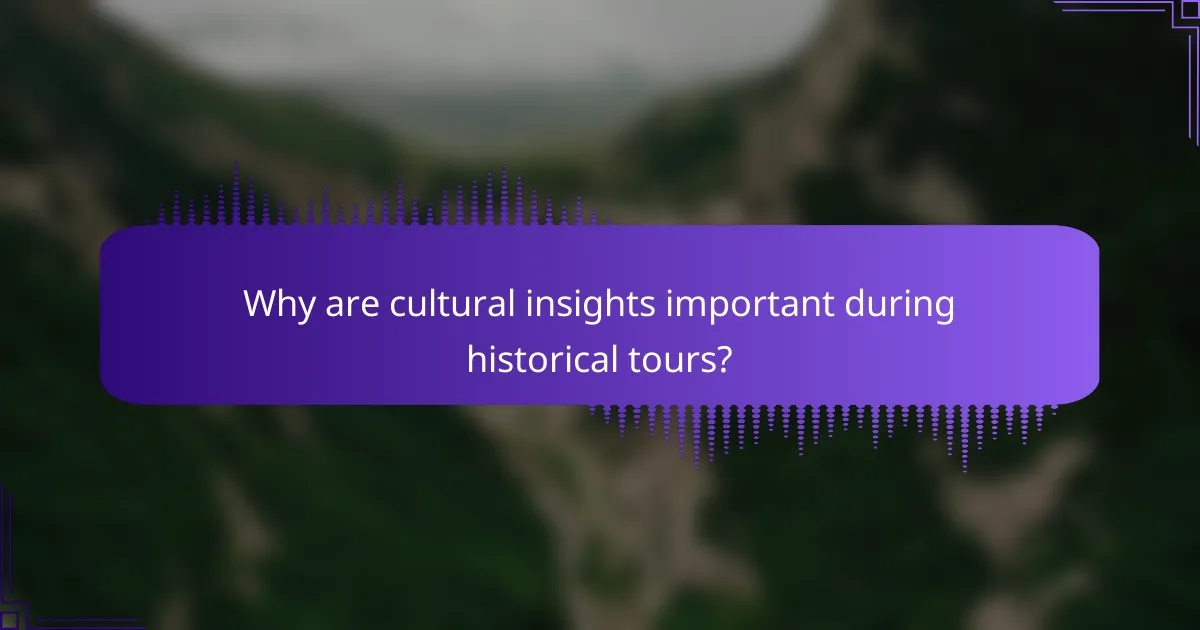
Why are cultural insights important during historical tours?
Cultural insights are essential during historical tours as they enhance understanding and appreciation of the context. They provide depth to the experience by connecting visitors with the traditions, beliefs, and daily lives of ancient Egyptians. This knowledge transforms mere observation of monuments into a richer narrative of human history. Engaging with local customs and stories fosters a deeper emotional connection to the sites, making the tour more memorable and impactful.
How do local customs influence the tour experience?
Local customs significantly enhance the tour experience in Egypt by providing deeper cultural insights. Engaging with local traditions allows travelers to understand the historical context of ancient sites. For example, participating in a traditional meal or attending a local festival can create memorable connections to Egypt’s rich heritage. Additionally, local guides often share unique stories and practices that are not found in standard tour narratives, enriching the overall experience. This cultural immersion fosters appreciation and respect for the local way of life, making historical tours more impactful.
What traditional practices can tourists expect to encounter?
Tourists can expect to encounter various traditional practices during historical tours in Egypt. These include local crafts, traditional music, dance performances, and culinary experiences. Visitors may witness artisans crafting pottery and textiles using ancient techniques. Traditional folk music and dance are often performed at cultural sites, enhancing the immersive experience. Culinary practices highlight regional dishes, showcasing Egypt’s rich gastronomic heritage. Engaging with these traditions provides deeper cultural insights and a connection to the country’s history.
Which cultural events coincide with historical tours in Egypt?
Cultural events that coincide with historical tours in Egypt include festivals, art exhibitions, and traditional performances. These events enhance the experience of exploring ancient sites. For instance, the Luxor African Film Festival occurs annually, showcasing African cinema alongside historical exploration. Additionally, the Cairo International Book Fair features literary discussions related to Egyptian history and culture. The Abu Simbel Sun Festival celebrates the alignment of sunlight with the temple’s inner sanctum, attracting visitors during historical tours. These cultural activities provide deeper insights into Egypt’s rich heritage.

What types of experiences are available for different traveler preferences?
Historical tours in Egypt cater to diverse traveler preferences, offering enriching experiences. Options include guided explorations of ancient sites, immersive cultural experiences, and specialized tours focusing on specific themes like archaeology or local traditions.
Guided experiences typically feature expert historians who provide insights into Egypt’s rich history. Cultural tours may include local cuisine tastings and traditional crafts demonstrations. Unique attributes of these tours often involve exclusive access to lesser-known sites or personalized itineraries.
Travelers seeking adventure can opt for off-the-beaten-path excursions, while those interested in luxury may choose private tours with premium services. Each type of experience enhances understanding of Egypt’s ancient wonders and cultural heritage.
How do adventure tours incorporate historical elements?
Adventure tours in Egypt effectively incorporate historical elements by blending ancient sites with interactive storytelling. Tour guides share rich narratives about the Pharaohs, monuments, and daily life in ancient Egypt, enhancing the visitor experience.
These tours often include visits to iconic locations like the Pyramids of Giza and the Valley of the Kings. Unique attributes, such as access to lesser-known archaeological sites, provide deeper cultural insights. As a result, participants gain a comprehensive understanding of Egypt’s historical significance, making the tours both educational and engaging.
What family-friendly options exist for exploring Egypt’s history?
Family-friendly options for exploring Egypt’s history include guided tours, family-oriented activities, and educational experiences. These options cater to various age groups and interests, ensuring engaging and informative experiences.
1. Family-friendly guided tours: Many tour operators offer tailored experiences that include visits to pyramids, temples, and museums, focusing on engaging narratives suitable for children.
2. Interactive museums: Institutions like the Egyptian Museum offer hands-on exhibits and activities designed for younger audiences, making learning about ancient history enjoyable.
3. Cultural experiences: Families can participate in local workshops, such as pottery or cooking classes, to gain insights into Egyptian culture while fostering teamwork and creativity.
4. Outdoor adventures: Exploring historical sites like the Valley of the Kings or Luxor can be combined with outdoor activities, such as camel rides or hot air ballooning, appealing to adventurous families.
Which luxury tours provide exclusive access to historical sites?
Luxury tours in Egypt that provide exclusive access to historical sites include private guided experiences at the Pyramids of Giza, the Valley of the Kings, and Luxor Temple. These tours often feature after-hours visits or small group sizes for a more intimate experience. Notable providers include Abercrombie & Kent and Insight Vacations, which offer tailored itineraries focusing on cultural insights and ancient wonders. Such tours frequently include unique attributes like access to restricted areas, expert archaeologist guides, and immersive cultural experiences.
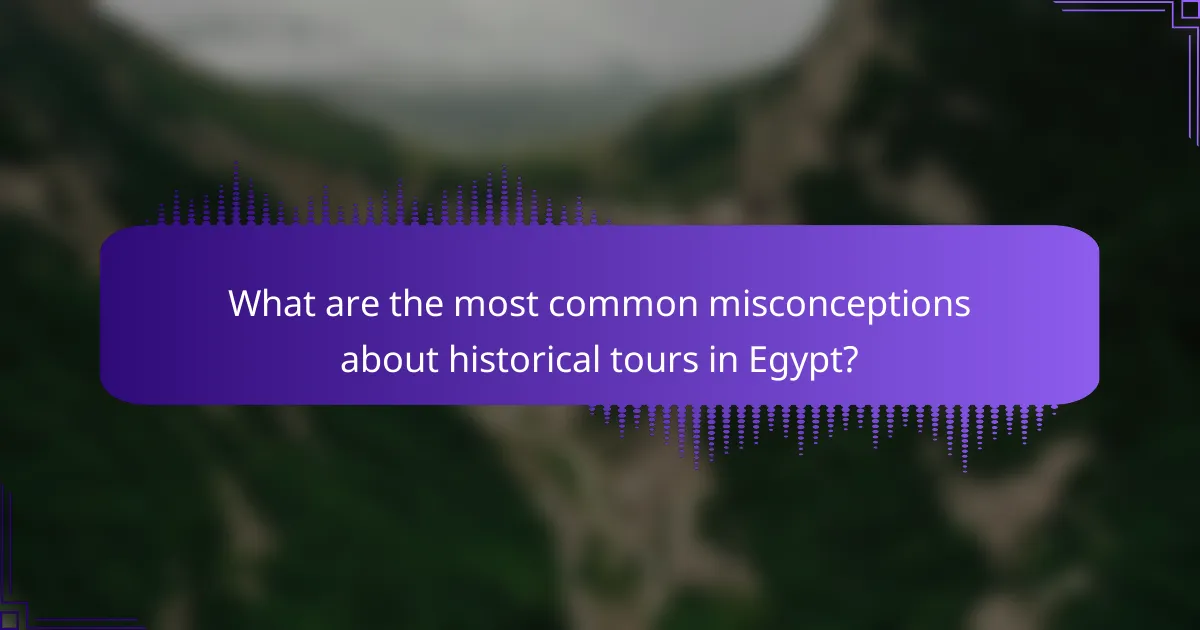
What are the most common misconceptions about historical tours in Egypt?
Many misconceptions exist about historical tours in Egypt, often leading to misunderstandings. One common belief is that tours only focus on famous sites like the Pyramids, while many also highlight lesser-known ancient wonders and cultural insights. Another misconception is that all tours are overly commercialized; in reality, many offer authentic experiences led by knowledgeable guides. Some people think historical tours are only for archaeologists or history buffs, but they cater to a wide audience, including families and casual travelers. Additionally, there’s a belief that these tours are too expensive; however, various options are available to suit different budgets.
How do prices for tours reflect the quality of the experience?
Prices for tours reflect quality through factors like guide expertise, group size, and included amenities. Higher prices often indicate more experienced guides and personalized experiences. For instance, small group tours typically offer deeper cultural insights and better engagement with the historical sites. Additionally, premium tours might include exclusive access to attractions or unique experiences, enhancing overall value.
What should travelers know about safety and security during tours?
Travelers should prioritize awareness of their surroundings and follow local guidelines for safety during tours in Egypt. Key safety tips include staying in groups, avoiding isolated areas, and keeping valuables secure.
Cultural sensitivity is crucial; respect local customs and dress codes to foster positive interactions. Use reputable tour guides and transportation services to enhance security.
Emergency numbers and locations of embassies should be noted in case of unforeseen situations. Staying informed about current events and travel advisories will help ensure a safe experience while exploring Egypt’s ancient wonders.
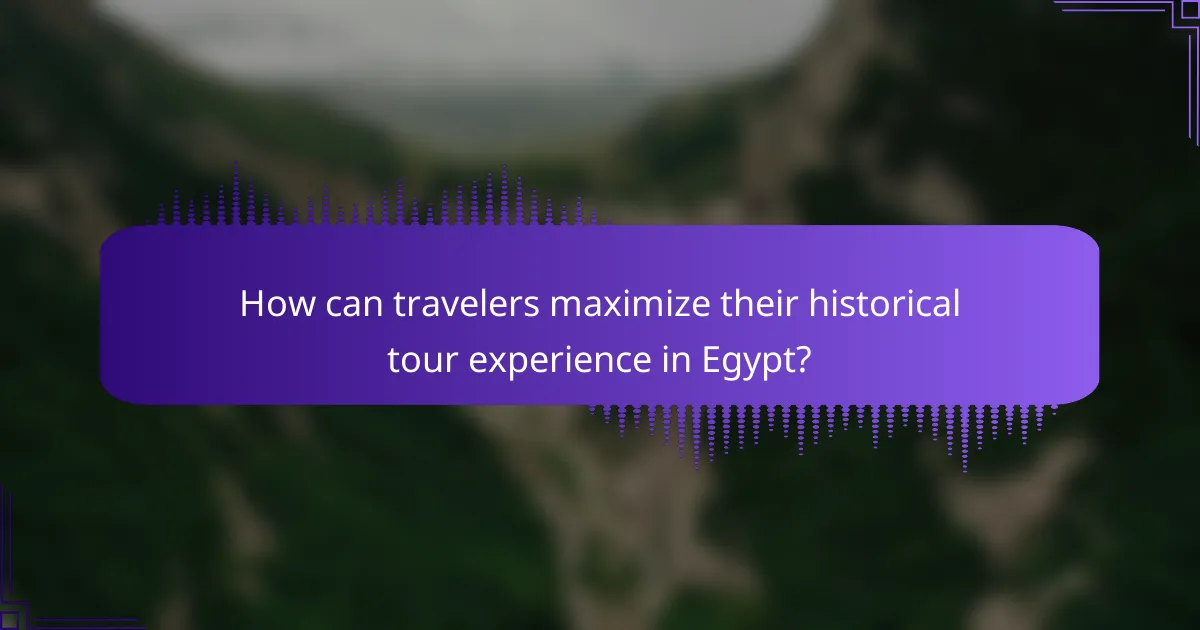
How can travelers maximize their historical tour experience in Egypt?
Travelers can maximize their historical tour experience in Egypt by planning ahead, engaging with knowledgeable guides, and immersing themselves in local culture.
To enhance the experience, consider these strategies:
1. Research historical sites: Understand the significance of locations like the Pyramids of Giza and the Valley of the Kings.
2. Choose guided tours: Professional guides provide insights and context that enrich the experience.
3. Visit during off-peak times: This reduces crowds and allows for a more personal exploration of sites.
4. Engage with local customs: Participate in cultural activities to gain deeper insights into Egyptian history and traditions.
5. Utilize technology: Use apps or audio guides to access additional information on historical landmarks.
By implementing these strategies, travelers can create a more meaningful and memorable journey through Egypt’s rich history.
What are the best practices for preparing for a historical tour?
To prepare for a historical tour in Egypt, research the sites you plan to visit, dress appropriately for the climate, and stay hydrated. Understanding local customs enhances the experience. Consider hiring a knowledgeable guide for deeper insights into ancient wonders. Planning your itinerary in advance helps maximize your time at each location.
What items should tourists bring to enhance their experience?
Tourists should bring comfortable walking shoes, sunscreen, a reusable water bottle, a camera, a hat, and a guidebook. These items enhance the experience of exploring Egypt’s historical sites. Comfortable shoes support long walks through ancient ruins. Sunscreen protects against strong sun exposure. A reusable water bottle ensures hydration while being eco-friendly. A camera captures unforgettable moments. A hat provides additional sun protection. A guidebook offers valuable insights into Egypt’s rich history and culture.
Which common mistakes should travelers avoid when touring Egypt?
Travelers should avoid common mistakes such as neglecting local customs, not hiring knowledgeable guides, and underestimating the climate. Understanding these factors enhances the experience of historical tours in Egypt.
1. Ignoring local customs can lead to misunderstandings and discomfort.
2. Skipping knowledgeable guides may result in missing critical cultural insights.
3. Underestimating the climate can affect health and enjoyment during tours.
4. Overpacking can make travel cumbersome, while not bringing essentials can lead to inconvenience.
5. Failing to plan for entry fees may disrupt the itinerary.
6. Not considering transportation options can lead to delays and missed sites.
